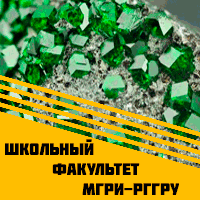Добрый день, Коллеги. Важное сообщение, просьба принять участие. Музей Ферсмана ищет помощь для реставрационных работ в помещении. Подробности по ссылке
Geologic modeling and mapping / Геологическое моделирование и картирование
Subsurface fluid flow is critically dependent on the 3D distribution of petrophysical properties in rocks. In sequences of sedimentary rocks these properties are strongly influenced by lithology and facies distribution that stem from the geologic processes that generated them. Three types of simulators are contrasted that represent variations of petrophysical properties: stochastic simulators, stratigraphic-form simulators, and sedimentary process simulators. The first two generally require closely spaced well information or seismic data and can be "conditioned" to accord with the data, but neither can represent the influence of depositional processes directly. By contrast, process simulators do not require closely spaced data, but they generally cannot be forced to accord closely with the data. The sedimentary processsimulator described here, known as SEDSIM, provides 3D geometric forms and spatial distributions of grain sizes of alluvial, fluvial, and deltaic deposits that are controlled by information supplied as initial and boundary conditions, including the initial topographic surface, and fluvial and sediment discharge volumes through time. The resulting sediment distributions can be compared directly with maps and sections based on well data and seismic surveys, but they can also be transformed into estimates of porosity and permeability, thereby placing them in form for direct use with subsurface flow simulators. Several recent applications of SEDSIM in generating descriptions of groundwater aquifers and hydrocarbon reservoirs and their use in subsurface flow simulations are presented. Comparisons between complex actual and simulated 3D sequences suggest that statistical descriptions of simulated sequences could be used as input to stochastic simulators. This would combine the advantages of stochastic simulators that can condition simulations to field data, with the advantages of process simulators that treat geometric forms and flow properties of sequences interdependently and represent the development of sedimentary facies through space and time. <...>
Sedimentary process simulation: a new approach for describing petrophysical properties in three dimensions for subsurface flow simulations
Modeling of multi component diagenetic systems
Modeling petroleum reservoirs in Pennsylvanian strata of the Midcontinent, USA
Thermal modeling at an ancient oro genetic front with special regard to the uncertainty of heat-flowpredictions
Effective transport properties of artificial rocks - means, power laws, and percolation
Three-dimensional modeling of geological features with examples from the Cenozoic Lower Rhine Basin
Volumetrics and rendering of geologic bodies by three-dimensional geometric reconstruction from cross sections or contour lines
The effect of seasonal factors on geological interpretation of MSS data
Reconstruction of the Leduc and Wabamun rock salts, Youngstown area, Alberta
Use of the computer for the structural analysis of the Ordovician sedimentary basin in Estonia
Pairwise comparison of spatial map data
Applications of spatial factor analysis to multivariate geochemical data
Geostatistical solution for the classification problem with an application to oil prospecting
Transition probability approach to statistical analysis of spatial qualitative variables in geology
An intelligent framework for geologic modeling applications




